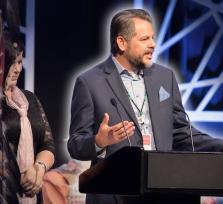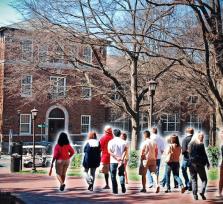Mariah Gladstone has found a recipe for success in her online cooking show Indigikitchen. Its name blends the words “Indigenous,” “digital,” and “kitchen,” and her weekly recipes, tips, and social media videos aim to reIndigenize the diets of Native Americans while tempting all viewers to opt for healthier diets. Her Facebook, Instagram, and YouTube posts have won her thousands of followers and interest from book agents and publishers.
“I want to get Native and non-Native people excited about Indigenous foods,” says Gladstone, an enrolled member of the Cherokee Nation and descendant of the Blackfeet Nation. “Our bodies fare better physically when we switch to an Indigenous-based diet. There’s a spiritual aspect when Native peoples eat foods of their ancestors. It recognizes the wisdom of our elders and strengthens our ties to Mother Earth.”
Gladstone earned her degree in environmental engineering from Columbia University, and she is completing her master’s in environmental science at SUNY College of Environmental Science and Forestry. She has also delivered a TEDx talk, done cooking demonstrations for the Smithsonian’s National Museum of the American Indian, testified before a Senate committee on a farm bill, and is currently writing a toolkit for Montana No Kid Hungry to incorporate Indigenous foods into schools.
She credits her parents with planting the seeds of her culinary curiosity. Her mother let her experiment in the kitchen when she was a girl. “I had the freedom to fail, to totally mess up. The worst-case scenario was we lost a bit of flour, sugar, and butter,” says Gladstone.
When she was in elementary school, her father and grandfather set out a garden for her. Gladstone sketched planting diagrams on graph paper, laid out soaker hoses, and fretted over plant pests. “I got to pull up carrots and tomatoes and shuck corn. It gave me the pride that comes with seeing things turn from seeds into food. I still think it’s absolutely magical,” she says. When she trekked to Manhattan for college from her Kalispell, Mont., home near the Blackfeet Reservation, she stuffed her carry-on bag with frozen packages of moose and elk.
Gladstone’s passion for cooking unites her tribal heritage with her scientific training. “It’s not engineering, per se, but in graduate school I’m finding the intersection of culinary arts, Indigenous sustainability, land management, and diet and nutrition in ways that fall under the same umbrella and aren’t sectioned off, and I use digital media to share that information with people,” she says.
Her website serves up treats like Squash Nested Elk, Blue Cornmeal Pancakes, Potawatomi Berry Rice, Blue Corn–Crusted Whitefish, Sweet Potato Breakfast Scramble, and even Indigenous Pad Thai with Cucumber Noodles.
Besides pleasing palates, Gladstone has a deeper mission — to improve the health of Native Americans. Life expectancies of Indigenous people in Montana are 20 years less than those of non-Natives, according to that state’s health department, because of high rates of diabetes, obesity, and heart disease. Nationwide, 79 percent of Native children say their communities lack access to healthy food, according to a report by the Center for Native American Youth.
Gladstone tailors her recipes to the needs of modern families. She knows 21st-century Indigenous Americans live hectic lives, like everyone else. “I have to make recipes fun, delicious, and approachable,” she says. Her dishes emphasize Indigenous staples like wild game, berries, wild rice, corn, and squash.
“I want to promote healthy, fresh foods people can feed their families using the modern kitchen,” Gladstone says. “We have to build community excitement because if I’m making super-complicated recipes that take a lot of time or don’t taste good, it doesn’t restore food systems.”
Her favorite recipe? Bison Butternut Lasagna. “It's so much better than regular lasagna. It's sweet, because it has butternut squash noodles,” she says. “You feel guilty while you're eating it, because you're, like, ‘I should be eating a vegetable,’ but it is a vegetable!”












